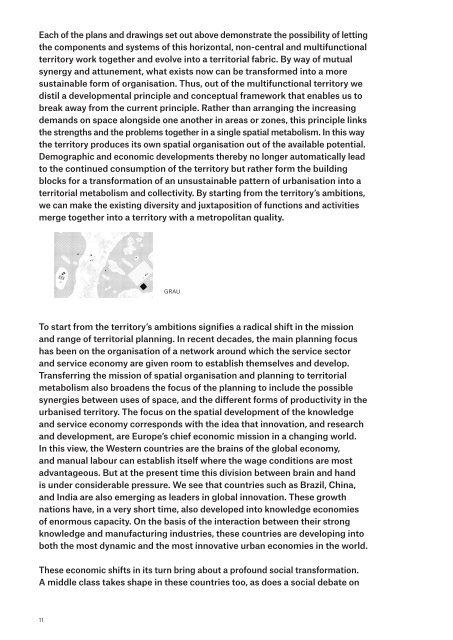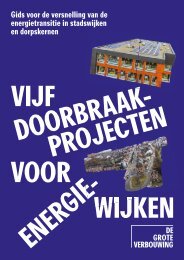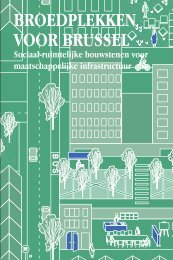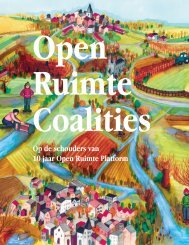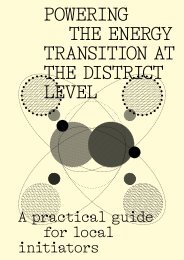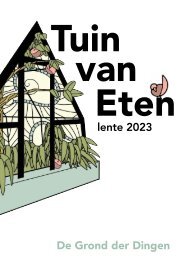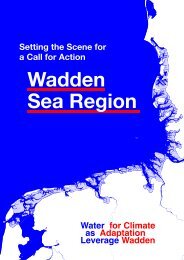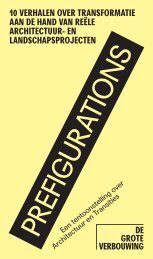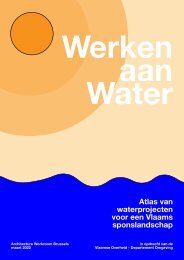The Ambition of the Territory Belgian Pavilion, 13th International Architecture Exhibition, La Biennale di Venezia 2012
You also want an ePaper? Increase the reach of your titles
YUMPU automatically turns print PDFs into web optimized ePapers that Google loves.
Each <strong>of</strong> <strong>the</strong> plans and drawings set out above demonstrate <strong>the</strong> possibility <strong>of</strong> letting<br />
<strong>the</strong> components and systems <strong>of</strong> this horizontal, non-central and multifunctional<br />
territory work toge<strong>the</strong>r and evolve into a territorial fabric. By way <strong>of</strong> mutual<br />
synergy and attunement, what exists now can be transformed into a more<br />
sustainable form <strong>of</strong> organisation. Thus, out <strong>of</strong> <strong>the</strong> multifunctional territory we<br />
<strong>di</strong>stil a developmental principle and conceptual framework that enables us to<br />
break away from <strong>the</strong> current principle. Ra<strong>the</strong>r than arranging <strong>the</strong> increasing<br />
demands on space alongside one ano<strong>the</strong>r in areas or zones, this principle links<br />
<strong>the</strong> strengths and <strong>the</strong> problems toge<strong>the</strong>r in a single spatial metabolism. In this way<br />
<strong>the</strong> territory produces its own spatial organisation out <strong>of</strong> <strong>the</strong> available potential.<br />
Demographic and economic developments <strong>the</strong>reby no longer automatically lead<br />
to <strong>the</strong> continued consumption <strong>of</strong> <strong>the</strong> territory but ra<strong>the</strong>r form <strong>the</strong> buil<strong>di</strong>ng<br />
blocks for a transformation <strong>of</strong> an unsustainable pattern <strong>of</strong> urbanisation into a<br />
territorial metabolism and collectivity. By starting from <strong>the</strong> territory’s ambitions,<br />
we can make <strong>the</strong> existing <strong>di</strong>versity and juxtaposition <strong>of</strong> functions and activities<br />
merge toge<strong>the</strong>r into a territory with a metropolitan quality.<br />
GRAU<br />
To start from <strong>the</strong> territory’s ambitions signifies a ra<strong>di</strong>cal shift in <strong>the</strong> mission<br />
and range <strong>of</strong> territorial planning. In recent decades, <strong>the</strong> main planning focus<br />
has been on <strong>the</strong> organisation <strong>of</strong> a network around which <strong>the</strong> service sector<br />
and service economy are given room to establish <strong>the</strong>mselves and develop.<br />
Transferring <strong>the</strong> mission <strong>of</strong> spatial organisation and planning to territorial<br />
metabolism also broadens <strong>the</strong> focus <strong>of</strong> <strong>the</strong> planning to include <strong>the</strong> possible<br />
synergies between uses <strong>of</strong> space, and <strong>the</strong> <strong>di</strong>fferent forms <strong>of</strong> productivity in <strong>the</strong><br />
urbanised territory. <strong>The</strong> focus on <strong>the</strong> spatial development <strong>of</strong> <strong>the</strong> knowledge<br />
and service economy corresponds with <strong>the</strong> idea that innovation, and research<br />
and development, are Europe’s chief economic mission in a changing world.<br />
In this view, <strong>the</strong> Western countries are <strong>the</strong> brains <strong>of</strong> <strong>the</strong> global economy,<br />
and manual labour can establish itself where <strong>the</strong> wage con<strong>di</strong>tions are most<br />
advantageous. But at <strong>the</strong> present time this <strong>di</strong>vision between brain and hand<br />
is under considerable pressure. We see that countries such as Brazil, China,<br />
and In<strong>di</strong>a are also emerging as leaders in global innovation. <strong>The</strong>se growth<br />
nations have, in a very short time, also developed into knowledge economies<br />
<strong>of</strong> enormous capacity. On <strong>the</strong> basis <strong>of</strong> <strong>the</strong> interaction between <strong>the</strong>ir strong<br />
knowledge and manufacturing industries, <strong>the</strong>se countries are developing into<br />
both <strong>the</strong> most dynamic and <strong>the</strong> most innovative urban economies in <strong>the</strong> world.<br />
<strong>The</strong>se economic shifts in its turn bring about a pr<strong>of</strong>ound social transformation.<br />
A middle class takes shape in <strong>the</strong>se countries too, as does a social debate on<br />
11


